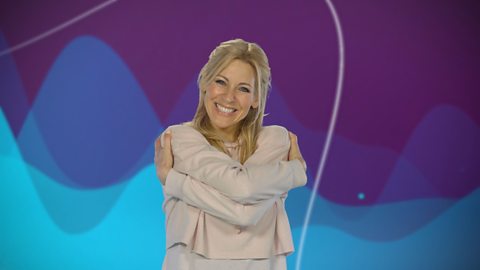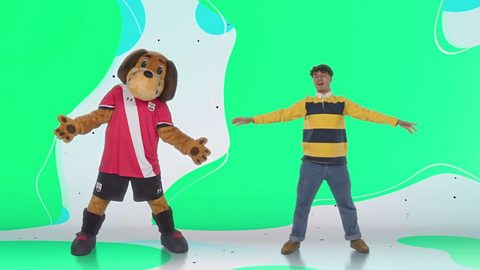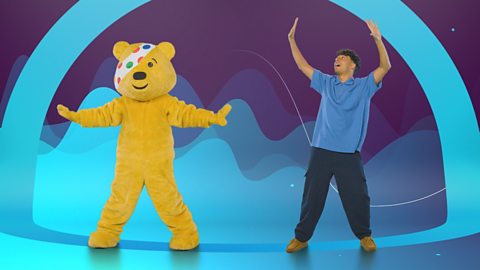OK, Super Movers, we all live our lives with different people from different places, and when we all pull together and get connected, we make this world a better place for everyone.
Let's learn more. We are the people together and we're rising up, bubbling up, bubbling up, bubbling up, bubbling, bubbling. bubbling.
Looking out for one another. We're moving up, moving up, moving up, moving up. Super Mover grooving.
Now there's a home for you and a home for me and then beyond our home we have community.
Everyone together so we move as one.
Moving up together. It's fun.
Be connected. This is me and you.
Stay connected. This is what we do.
Be connected. This is us and we.
We're all moving up together in communities.
Be connected. We can get this done, stay connected. Moving up as one. Be connected.
Embrace diversity. Bringing people together in communities.
Yep. That's real good.
Here we go, when we live in a community, there's always something new. Bring it on. Bring it on. Walla walla, ding dong.
So many fun ideas for what we can do. We can do, we can do. Do ballaba do.
Connected together, no matter who we are, who we are, who we are, this is who we are.
If we stay well connected, then we'll all go far.
Connect, connect, connect, connect.
So there's a home for you and a home for me, respecting our backgrounds and our histories.
Helping one another. So we move as one.
Achieving more together. It's fun.
Be connected. This is me and you.
Stay connected. This is what we do.
Be connected. This is us and we.
We we're all moving up together in communities.
Be connected. We can get this done.
Stay connected. Moving up as one.
Be connected, living in harmony,
Bringing people together in communities.
Getting help from our close neighbours.
Our doctors and nurses and our great teachers.
Appreciate.
A smile will make their day. And saying please and thank you goes a long, long way.
Including everybody. This is what we do.
How much you join in is really up to you. But if you get involved, we'll be right on track because the more we put in, the more we get back.
Be connected. This is me and you.
Stay connected. This is what we do.
Be connected. Embrace our history.
We're moving up together in communities.
Be connected. Moving up as one.
Stay connected and now this song is done. Be connected. It's always us and we, bringing people together in communities.
Sammy Saint and Billy Badger perform this memorable Super Mood Movers song about coming together and giving something back.
After viewing, singing and dancing along, your class could try some of these activities to further explore their learning:
Activities
- Community poems: Establish that, 'A community is formed when people do something to show they care about the others in the neighbourhood.' Together, pupils could contribute to a whole-class acrostic poem that spells out the word COMMUNITY. You could start them off with: 'C is for caring about others around us, O is for our homes, our neighbours and our streets…'
- Communication poems: Communities are all about communication, reaching out to people and encouraging them to get involved. Ask: 'How can we communicate effectively with one another?' Guide the pupils' responses to ideas such as: respecting one another, listening to other points of view, welcoming others, not leaving people out and respecting people's differences too. Pupils could go on to write their own acrostic poems that spell out the word COMMUNICATION.
- Community maps: Ask pupils to name 'community spaces' in their neighbourhood, places that belong to all of us, or to groups of us, where people come together. List the pupils' suggestions, which might include: our school, the park, the adventure playground, the cinema, the doctor's surgery, the library, the health centre, the nursery, the soft-play centre, the pensioners' day centre, the church, mosque, temple or gurdwara, the swimming pool, the supermarket, the post office, the corner shop. Challenge pupils to draw a neighbourhood map, showing all these community spaces. Ask: 'Which of these community spaces is the most important to you?' Pupils could discuss the question, argue for their priorities and finally vote on a class top five or top ten.
- Belonging: Ask - 'To which groups in the community do we belong?' Encourage children to list possibilities: their family; the bigger 'family' of school; friendship groups; clubs and other groups; libraries; places of worship; the neighbourhood.
- Model community space: Pupils could use a construction toy to build a model of a new kind of community space that could bring different people together. They could take turns to share their community space ideas with the class.
- Inclusion: Ask - 'Who might find it difficult to take part in community life? What can we do to help?' Pupils might note ways their school building or another public building has been made welcoming to people with different needs.
- Charities: Ask children to list the charities they know about. Prompt the class by asking them to name all the charity shops in the neighbourhood. Pupils could draw the charity logos they know and contribute them to a wall display. Ask: 'What is a charity?' guide the pupils' responses to a definition such as: 'A charity is an organisation that uses the help of volunteers to try to help people and communities and make life better.'
- Why do people support charities?: Encourage children to discuss this question in small groups. Gather their responses in a whole-class discussion, which might include ideas such as: 'People see things that are wrong and want to put them right'; 'They want to see a better world'; 'They want to be a part of their community'; 'It feels good to give something back to the world'; 'It's a human thing to care and share.'
- Charity research: Ask pupils to work in pairs to find out more about a charity of their choice, by visiting that charity's website. The pairs could make two-minute presentations to the class about their chosen charity.
- How could I help?: Ask - 'How could children get involved in the work of charities if they want to do so?' and 'Are charities just about raising money for good causes?' Establish that, as well as raising money, charities also campaign to highlight issues, change behaviour or encourage people to get involved with their communities. As well as sponsored events (often open to children), another way someone could get involved might be to take part in 'world' or 'national' days and weeks to highlight an issue, e.g. 'Poppy Day', 'Red Nose Day' or 'Anti-Bullying Week'. Children might also suggest collecting items to give to charity shops, or choosing a charity shop when spending pocket money on presents and cards. Most professional football clubs also have community-based programmes that children can get involved with. Many encourage and organise social action projects that support the local community.
- Community - what do these words mean to me?: Write this list on the blackboard or whiteboard: community, joining in, contributing, getting involved, being part of something, co-operating, respect, diversity, communicating, participating, connecting. Ask pupils to choose two items and write a paragraph about each, explaining why it is important to community life.
Learning aims or objectives
The Super Mood Movers song Giving Something Back and these activity notes address the following learning objectives from the curriculum guidance of the four UK nations.
England, PHSE and RSE
From the PSHE Association programme of study:
- L6. about the different groups that make up their community; what living in a community means.
- L7. to value the different contributions that people and groups make to the community.
- L8. about diversity: what it means; the benefits of living in a diverse community; about valuing diversity within communities.
From the RSE guidance:
- Mental wellbeing:
- The benefits of … community participation, voluntary and service-based activity on mental wellbeing and happiness.
- Time spent with friends and family and the benefits of hobbies and interests.
- Families and people who care for me:
- The characteristics of healthy family life … the importance of spending time together and sharing each other’s lives.
- That others’ families, either in school or in the wider world sometimes look different from their family, but that they should respect those differences and know that other children’s families are also characterised by love and care.
Northern Ireland, PD&MU
From the Northern Ireland curriculum for Personal Development and Mutual Understanding:
- Relationships (Strand 2):
- Initiating and sustaining mutually satisfying relationships.
- Find out about sources of help and support for individuals, families and groups.
- Rules, Rights and Responsibilities (Strand 2):
- Identify the variety of groups that exist within the community and their the roles and responsibilities.
- Consider the rights and responsibilities of members of the community.
- Similarities and Differences (Strand 2):
- Valuing and celebrating cultural differences and diversity.
- Learning to live as members of the community (Strand 2):
- Playing an active and meaningful part in the life of the community and be concerned about the wider environment.
- Appreciate the interdependence of people within the community.
Scotland, PSE
Curriculum for Excellence Health and Wellbeing Experiences and Outcomes:
- Social wellbeing:
- As I explore the rights to which I and others are entitled, I am able to exercise these rights appropriately and accept the responsibilities that go with them. I show respect for the rights of others (HWB 1-09a / HWB 2-09a).
- I recognise that each individual has a unique blend of abilities and needs. I contribute to making my school community one which values individuals equally and is a welcoming place for all (HWB 1-10a / HWB 2-10a).
- Representing my class, school and/or wider community encourages my self-worth and confidence and allows me to contribute to and participate in society (HWB 1-12a / HWB 2-12a).
- Through contributing my views, time and talents, I play a part in bringing about positive change in my school and wider community (HWB 1-13a / HWB 2-13a).
- I value the opportunities I am given to make friends and be part of a group in a range of situations (HWB 1-14a / HWB 2-14a).
Wales, PSE
From the Personal and Social Education Framework for 7 to 19-year-olds in Wales:
- Active citizenship:
- Develop respect for themselves and others.
- Value families and friends as a source of mutual support.
- Value diversity and recognise the importance of equality of opportunity.
- Participate in school life; the benefits of families and friends.

More from Super Mood Movers:
Wellbeing. video
Naomi Wilkinson performs this comforting Super Mood Movers song about taking care of our mental wellbeing.

Rights and respect. video
Rhys Stephenson performs this stirring Super Mood Movers song about respecting ourselves and others.

Change is life. video
Karim Zeroual and Southampton mascot Sammy Saint perform this heartening Super Mood Movers song about how change is a part of life.

Look after yourself. video
Pudsey and Karim Zeroual perform this catchy Super Mood Movers song about looking after yourself and taking on new challenges.

We are citizens! video
Rhys Stephenson performs this lively Super Mood Movers song about being good citizens.
